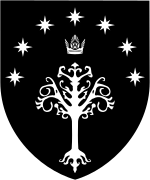| Gondor | |
|---|---|
| J. R. R. Tolkien's legendarium location | |
 Coat of arms bearing the white tree, Nimloth the fair[T 1] | |
| First appearance | The Lord of the Rings |
| In-universe information | |
| Other name(s) | The South-kingdom |
| Type | Southern Númenórean realm in exile |
| Ruler | Kings of Gondor; Stewards of Gondor |
| Location | Northwest Middle-earth |
| Capital | Osgiliath, then Minas Tirith |
| Founder | Isildur and Anárion |
Gondor is a fictional kingdom in J. R. R. Tolkien's writings, described as the greatest realm of Men in the west of Middle-earth at the end of the Third Age. The third volume of The Lord of the Rings, The Return of the King, is largely concerned with the events in Gondor during the War of the Ring and with the restoration of the realm afterward. The history of the kingdom is outlined in the appendices of the book.
Gondor was founded by the brothers Isildur and Anárion, exiles from the downfallen island kingdom of Númenor. Along with Arnor in the north, Gondor, the South-kingdom, served as a last stronghold of the Men of the West. After an early period of growth, Gondor gradually declined as the Third Age progressed, being continually weakened by internal strife and conflict with the allies of the Dark Lord Sauron. By the time of the War of the Ring, the throne of Gondor is empty, though its principalities and fiefdoms still pay deference to the absent king by showing their loyalty to the Stewards of Gondor. The kingdom's ascendancy is restored only with Sauron's final defeat and the crowning of Aragorn as king.
Based upon early conceptions, the history and geography of Gondor were developed in stages as Tolkien extended his legendarium while writing The Lord of the Rings. Critics have noted the contrast between the cultured but lifeless Stewards of Gondor, and the simple but vigorous leaders of the Kingdom of Rohan, modelled on Tolkien's favoured Anglo-Saxons. Scholars have noted parallels between Gondor and the Normans, Ancient Rome, the Vikings, the Goths, the Langobards, and the Byzantine Empire.
Cite error: There are <ref group=T> tags on this page, but the references will not show without a {{reflist|group=T}} template (see the help page).